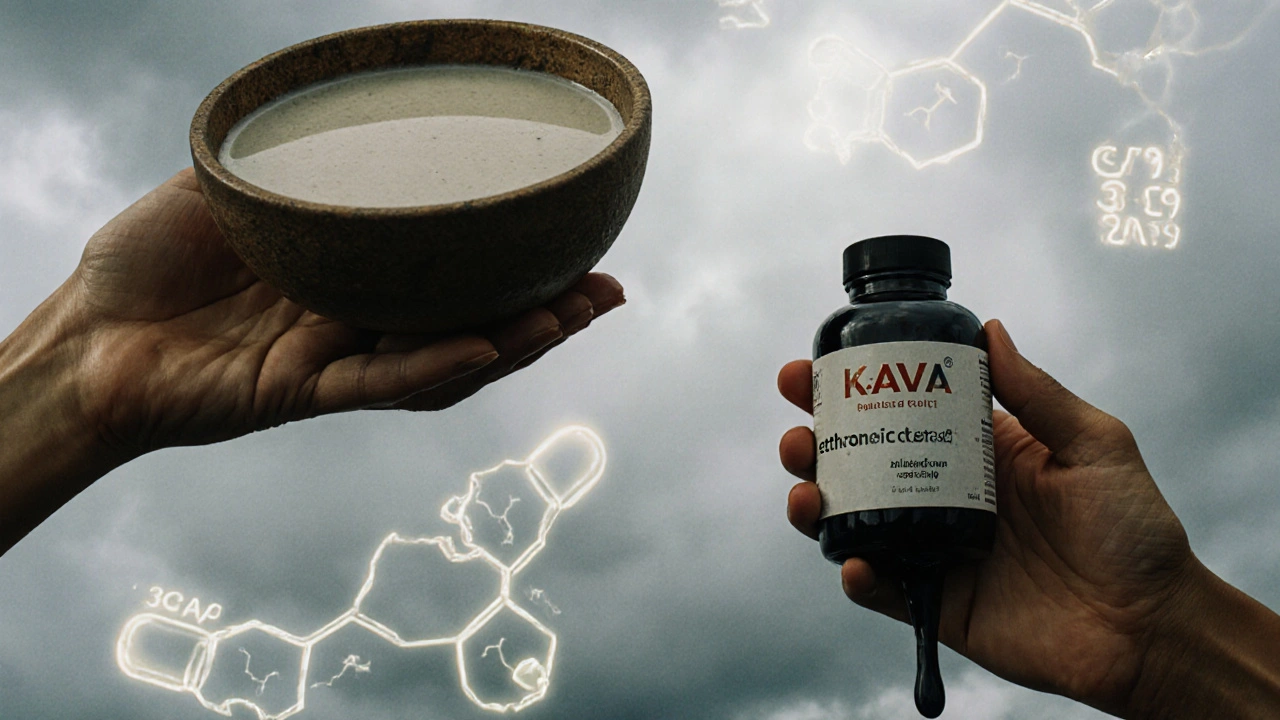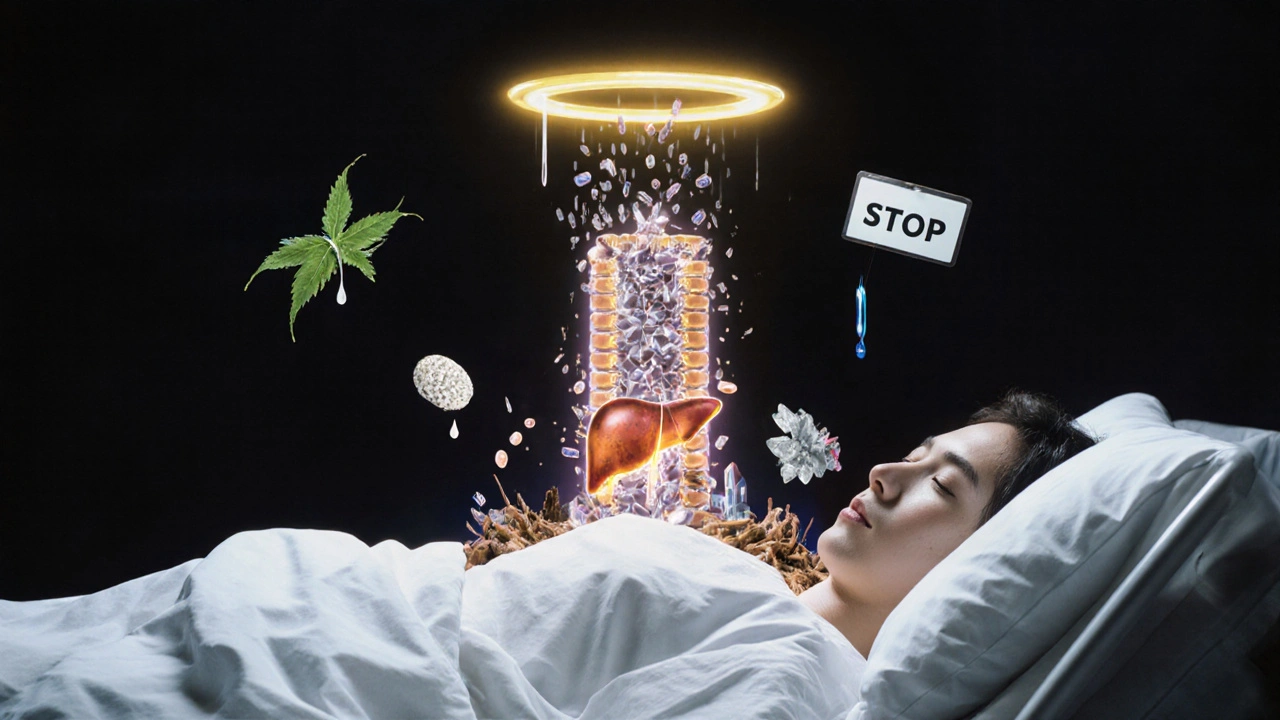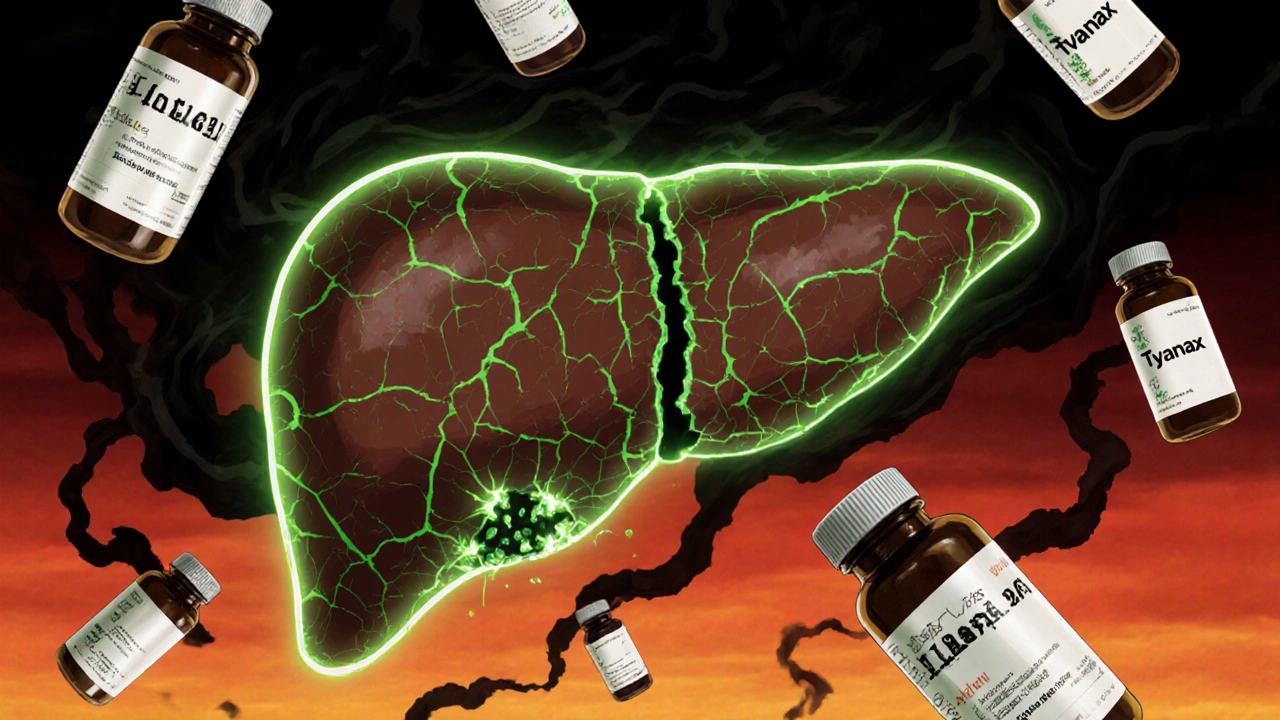Many people turn to kava for anxiety relief, drawn by its calming effects and reputation as a natural alternative to prescription drugs. But if you're taking any medications-whether for blood pressure, depression, pain, or even birth control-kava could be putting your liver at serious risk. The truth isn't just about side effects; it’s about hidden, potentially deadly interactions that most users never see coming.
How Kava Affects Your Liver
Kava comes from the roots of the Piper methysticum plant, traditionally brewed as a drink in Pacific Island cultures. For centuries, people there consumed it without major liver issues. But the kava sold in the U.S. and Europe today isn’t the same. Most commercial products use ethanol or acetone to extract the active compounds, called kavalactones. These solvent-based extracts are far more likely to damage the liver than traditional water-based preparations. The problem isn’t just the kavalactones. Research points to other compounds in kava-like flavokawains-as the real culprits behind liver injury. These substances deplete glutathione, your liver’s main antioxidant defense. Without enough glutathione, toxins build up and cause cell death. In extreme cases, this leads to acute liver failure. A documented case from UCLA Health shows how fast this can happen: a patient taking 240 mg of kavalactones daily developed jaundice and nausea after 16 weeks. Within a week, their liver enzymes spiked to over 2,400 U/L (normal is under 17). They went into liver failure and needed a transplant within 17 weeks.Why Medications Make Kava More Dangerous
Kava doesn’t just harm the liver on its own. It interferes with how your body processes other drugs. It blocks key liver enzymes-CYP3A4, CYP2C9, and CYP2C19-that break down over 80% of commonly prescribed medications. When these enzymes are inhibited, drugs stick around longer in your system, building up to toxic levels. Here’s what this means in real life:- If you take acetaminophen (Tylenol), kava increases the risk of liver damage from even normal doses.
- If you’re on statins for cholesterol, kava can cause muscle breakdown and liver stress.
- If you use benzodiazepines like Xanax or sleeping pills, kava can amplify sedation to dangerous levels.
- Birth control pills containing ethinyl estradiol have been linked to liver injury when combined with kava.
- Antidepressants, antipsychotics, and blood thinners like warfarin also interact dangerously.

Who’s at Highest Risk?
Not everyone who takes kava will have problems-but certain factors make liver damage far more likely:- Using solvent-based extracts: Ethanol or acetone extracts are 5-10 times more likely to cause liver injury than water-based ones.
- Taking high doses: More than 250 mg of kavalactones per day increases risk dramatically.
- Drinking alcohol: Even moderate drinking while using kava multiplies liver stress.
- Having pre-existing liver disease: Fatty liver, hepatitis, or elevated enzymes mean your liver is already compromised.
- Genetic differences: Some people naturally have slower liver enzyme activity, making them more vulnerable to drug buildup.
- Long-term use: Most liver injuries occur after 3-6 months of daily use.
What the Research Says
Despite its popularity, recent studies challenge the idea that kava is safe. A 2019 clinical trial with 171 participants found that liver enzyme abnormalities were significantly more common in those taking kava than in those taking a placebo. Another review of 11 trials from 2003 found that while kava worked for anxiety, the risk-benefit ratio was questionable when liver safety was considered. The FDA issued a consumer advisory in 2002 after 11 U.S. patients required liver transplants due to kava use. Since then, over 100 cases of kava-related liver injury have been reported globally. Germany and Switzerland documented 26 cases-all from organic extracts. In contrast, Pacific Island populations using traditional water-based kava have no recorded cases of liver failure. The World Health Organization concluded there’s a clear cause-and-effect link between kava and liver damage, especially when combined with other drugs. The European Union banned kava in 2002. Australia restricts it to prescription-only. Canada and several other countries have issued strong warnings.
What You Should Do
If you’re currently using kava and taking any medication, stop immediately and talk to your doctor. Don’t wait for symptoms. Liver damage often shows up late-when it’s already severe.- Get a liver panel: Ask for ALT, AST, bilirubin, and alkaline phosphatase tests. Normal results don’t guarantee safety, but elevated levels mean you need to stop kava now.
- Switch to water-based kava: If you insist on using kava, only use products labeled as “traditional water extraction.” Avoid tinctures, capsules, or extracts made with alcohol.
- Never combine with alcohol: Even one drink a day raises your risk.
- Don’t use if you have liver disease: No exceptions. Not even “a little bit.”
- Stop kava at the first sign of trouble: Nausea, dark urine, yellow eyes, fatigue, or abdominal pain are red flags.
Alternatives to Kava
If you’re using kava for anxiety, there are safer, evidence-backed options:- L-theanine: An amino acid in green tea that promotes calm without sedation or liver risk.
- Valerian root: Used for sleep and anxiety; much lower risk profile than kava.
- Magnesium glycinate: Helps regulate the nervous system and reduce stress.
- Cognitive behavioral therapy (CBT): Proven to reduce anxiety long-term without any physical side effects.
- Prescription options: SSRIs like sertraline or buspirone are safer for long-term use than kava.
Can I take kava with my antidepressants?
No. Kava inhibits liver enzymes that break down most antidepressants, including SSRIs and SNRIs. This can cause dangerous drug buildup in your blood, increasing side effects like dizziness, confusion, and liver damage. There are no safe combinations documented. Stop kava immediately if you’re on antidepressants.
Is water-based kava safe with medications?
Even water-based kava can interfere with liver enzymes and deplete glutathione. While it’s far less toxic than solvent extracts, it still carries risk when combined with medications metabolized by CYP3A4, CYP2C9, or CYP2C19. Experts recommend avoiding all forms of kava if you’re on prescription drugs.
How long does it take for kava to damage the liver?
Liver injury can develop as early as 3 weeks, but most cases appear after 3-6 months of daily use. Some people develop symptoms faster if they have genetic risk factors, take high doses, or use solvent-based extracts. There’s no safe timeline-only varying levels of risk.
Do all kava supplements have the same risk?
No. Water-based extracts from traditional preparations carry the lowest risk. Ethanolic and acetonic extracts-common in capsules and tinctures-are linked to nearly all documented cases of liver failure. Always check the extraction method on the label. If it doesn’t say, assume it’s risky.
Can I take kava occasionally, like once a week?
Even occasional use can be dangerous if you’re on medications. Liver enzymes don’t need constant exposure to be inhibited. One dose can slow drug metabolism for days. If you’re taking blood thinners, statins, or antidepressants, even weekly use isn’t safe.
What should I do if I think kava hurt my liver?
Stop taking kava immediately. See your doctor and ask for a liver function panel (ALT, AST, bilirubin). If levels are elevated, you may need further testing. Most cases improve after stopping kava, but severe damage can require transplant. Don’t wait for symptoms-get tested if you’ve used kava with other medications.


Beth Banham
November 5, 2025 AT 19:31Been using kava for anxiety for about 6 months. Never thought about liver enzymes until I read this. My ALT was normal last check but I’m stopping anyway. Better safe than sorry.
Thanks for laying this out so clearly.
Alyssa Salazar
November 6, 2025 AT 01:16Let’s be real - the FDA advisory was in 2002 and we’re still selling this shit like it’s herbal tea. The CYP3A4 inhibition is well-documented, and yet people pop kava capsules like they’re gummy vitamins. The solvent-based extracts? Pure chemical liability. If you’re combining it with statins or SSRIs, you’re not being ‘natural’ - you’re playing Russian roulette with your hepatocytes.
And don’t even get me started on the ‘water-extracted is safe’ myth. Glutathione depletion doesn’t care about your extraction method. The mechanism is the same. Just slower.
Amber O'Sullivan
November 6, 2025 AT 17:01My cousin took kava with her blood pressure med and ended up in the ER with jaundice. They didn’t even ask about supplements. She’s lucky she didn’t need a transplant. Why do doctors never ask about herbs
they only care about your pills
Jim Oliver
November 8, 2025 AT 11:41Of course you’re taking kava. You’re the same person who thinks ‘natural’ means ‘safe’ and ‘dietary supplement’ means ‘not regulated.’ You’re not a victim of Big Pharma - you’re a victim of your own ignorance. The liver doesn’t care if it’s organic or fair-trade. It only cares about enzyme inhibition and glutathione depletion. Stop pretending you’re a wellness warrior when you’re just a walking liver failure case waiting to happen.
Brierly Davis
November 8, 2025 AT 22:09Y’all need to chill. I’ve been taking water-based kava for 2 years with no issues. My liver enzymes are perfect. I don’t take anything else but a daily multivitamin. Maybe the problem isn’t kava - maybe it’s the combination with meds and alcohol?
Don’t throw the baby out with the bathwater. Just be smart about it 😊
William Priest
November 10, 2025 AT 14:48water based kava? more like watered down bs. if it was really safe why did germany ban it? why did australia make it rx only? why are there 100+ liver failure cases in the literature? you’re not special. your liver isn’t magic. stop lying to yourself
Ryan Masuga
November 11, 2025 AT 17:38I get it - kava helped me sleep better than melatonin ever did. But I read this and I’m switching to L-theanine. It’s not as ‘spiritual’ but it’s way less scary. Also started CBT sessions - turns out my anxiety isn’t about kava, it’s about my job. Who knew?
Thanks for the wake-up call. I’m grateful.
Jennifer Bedrosian
November 12, 2025 AT 11:52OMG I JUST REALIZED I’VE BEEN TAKING KAVA WITH MY ANTIBIOTICS FOR 3 MONTHS
MY LIVER IS PROBABLY DEAD
IM CRYING
WHY DID NO ONE TELL ME
IM SO STUPID
IM GOING TO THE DR NOW
PLEASE PRAY FOR ME
Lashonda Rene
November 13, 2025 AT 07:27Okay so I’ve been reading this whole thing and I’m just trying to understand - so if I use kava once a week and I’m not on any meds and I don’t drink alcohol and I use the water-based kind from a trusted source - is it still risky? Like what’s the actual percentage of people who get liver damage? Is it like 1 in 1000 or 1 in 100? I just want to know if I’m being reckless or if I’m just being cautious. I mean, people drink alcohol and smoke and eat sugar and nobody says anything about that. Why is kava the villain? It’s been used for centuries. Maybe it’s not the kava, maybe it’s the way we’re processing it now. I just want to make an informed choice without being scared into never trying anything natural again.
Andy Slack
November 14, 2025 AT 00:16Just stopped kava today. My doctor said my AST was 140. I thought I was just tired. Turns out I was one missed checkup away from needing a transplant. I’m switching to magnesium glycinate and daily walks. My anxiety didn’t disappear - but now I’m alive to deal with it.
Thanks for the warning. You saved my liver.
Rashmi Mohapatra
November 15, 2025 AT 16:51you americans always overreact. in india we use ashwagandha and nobody dies. kava is just a plant. if your liver is weak then dont take anything. its not the herb its your body. stop blaming plants for your poor lifestyle
Abigail Chrisma
November 17, 2025 AT 01:00As someone raised in a Pacific Island community where kava is part of ceremony and connection - I want to say this: the traditional water-based preparation, consumed in moderation during communal gatherings, is not the same as the concentrated extracts sold in gas stations. The cultural context matters. The extraction matters. The dosage matters. But when you take it daily in capsule form while on statins? That’s not tradition. That’s self-medication with a side of ignorance.
Don’t erase the culture to justify your convenience.
Ankit Yadav
November 18, 2025 AT 06:46Good post. I’m a med student and this is exactly why pharmacology needs to include herbal interactions. Most students learn about drug-drug interactions but never drug-herb. Kava is just the tip of the iceberg. St. John’s Wort, grapefruit, turmeric - they all mess with CYP enzymes. We need better labeling, better doctor education, and better public awareness. This isn’t fearmongering - it’s clinical reality.